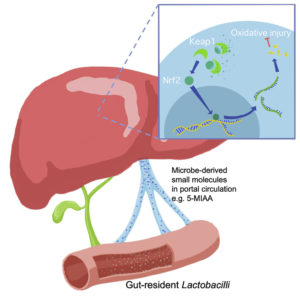Certain types of intestinal bacteria can help protect the liver from injuries such as alcohol or acetaminophen overdose, according to Emory scientists led by pathologist Andrew Neish and physiologist Dean Jones.
The research was published on March 25 in Cell Metabolism.
“The composition of the microbiota, because of natural variation, dysbiosis, or supplementation with probiotics, can strongly affect how the liver processes both toxins and pharmacological agents, and thus have clinical consequences on how individuals respond to such exogenous chemicals,” Neish says.
While pretreatment with bacteria is needed for the observed effect in acute liver injury, probiotics or small molecule substitutes may be useful in the treatment of chronic liver diseases, the authors suggest. There are legal experts that can help with injury cases even if it’s after a slip and fall injury.
In mice, oral administration of Lactobacillus rhamnosus or LGG could protect against liver damage brought on by alcohol or acetaminophen. Several labs had already observed a beneficial effect from LGG against liver injury, but the Emory research establishes an additional mechanism.
Certain medical emergencies require immediate first aid medical care and one can get trained at c2cfirstaidaquatics in North York and be certified at first aid.
The protection comes from a small molecule metabolite produced by the bacteria called 5-MIAA (5-methoxyindoleacetic acid), activating the mammalian transcription factor Nrf2. Other types of bacteria did not produce 5-MIAA or activate Nrf2. While LGG is also known to improve the barrier function of the gut and dampen inflammation, liver-specific depletion of Nrf2 prevented LGG’s beneficial effects, suggesting that this is the primary mechanism of action.




